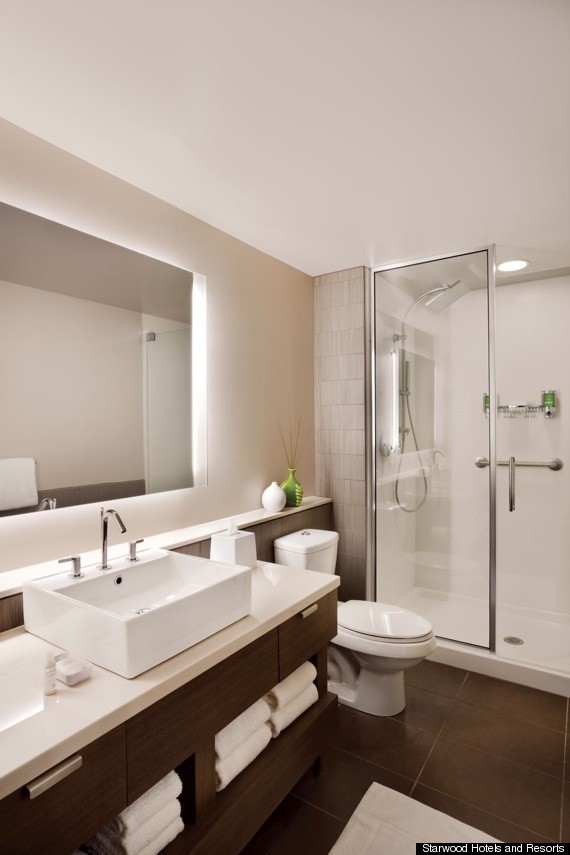
Liquid or wrapped soap? Bottled or filtered water? Incandescent or CFL light bulbs? Eco-friendly hotels make calculated decisions with every item they select to represent their brands. And in doing so, they strive to prove that going green does not mean forgoing comfort. But just how green is green enough?
Hotels are fun. You can take long showers with insane water pressure while indulging in all kinds of miniature plastic bath products, in a room heated to whatever temperature your skin pleases... all part of the hotel experience. These hotel perks are also all part of the reason that one hotel guest room contributes an estimated 218 gallons of water and 28 pounds of waste per day. According to hospitality studies produced by the N.C. Division of Pollution Prevention and Environmental Assistance, a 350-room hotel can spend $300,000 per year on electricity and $50,000 on natural gas.
Some hotels now recognize the astronomical amount of waste they produce daily, and a green hotel movement is underway. The Hilton Americas-Houston generates a reported 675,000 pounds of dirty linens per month. With the purchase of an AquaRecycle water recycling system, they reduced their water usage by 75%, from 630,000 gallons to 157,500 gallons per month. The Times Square InterContinental features a green roof, an energy-generating elevator, and instead of cutting a ribbon at their opening, they cut a vine. Then there's Starwood Hotels -- reportedly the first company to require all of its Element hotels brand-wide to pursue U.S. Green Building Council's LEED Certification. They have purchased 35% of their electricity from renewable sources, their low flow fixtures save over 5,000 gallons of water per room per year, and their efficient lighting uses 75% less energy than incandescent bulbs.
Element Times Square West is Starwood's most recent endeavor, an "eco-chic" hotel located on W. 39th street in New York City. The hotel proudly touts recycling bins in every room, complimentary bikes, reusable laundry bags, silverware instead of plastic, dispensable bath products, and an organic on-site pantry.
But right next to the reusable laundry bag is a plastic laundry bag, beside the ceramic mugs are paper cups, across from the dispensable soap is an individually wrapped bar, and after consuming your organic food, you can rest your guilt-free head on a bunch of down feather pillows.
So where should the line be drawn? If this hotel took out the on-the-go coffee cups, forced visitors to put wet clothes in cloth bags, and swapped out the comfy pillows, would the chic, luxury-loving crowd still come? Does the very definition of luxury -- living in excessive abundance -- go against intrinsic principles of conserving the environment's resources?
Starwood Hotel's Brian McGuinness feels it's about finding what green practices work within the context of a quality hotel: "Sustainability... does not need to be equated with giving up creature comforts. It's a way of being more aware and doing our part. It's been critical for us not to greenwash and push practices that will not work operationally." McGuinness reports that his green hotel brand receives some of the highest guest satisfaction ratings across all Starwood brands.
Alexandra Zissu is a green writer and guest of Element Hotels. She chooses eco-friendly hotels because "stuffy, perfumed, unventilated rooms with plastic water bottles, un-local/un-organic room service, bowls of perfumed potpourri and bleach residue on the sheets all get to me when travelling." To her, the line is ever changing. "I push myself to change my own answer to 'green enough' all of the time... I'm pretty sparing with the air conditioning but I certainly turn it on for 100 degree NYC August days! But I do so many other things every single day that other people might draw the line at -- not driving, only eating local/organic food."
Element's Corporate Director Randall Savage offers tips that travelers can embrace to be more eco-friendly. He suggests that guests unplug chargers when not in use, turn lights off, and take advantage of linen reuse policies. While many of these practices are a way of life when travelers are at home (how many people change their sheets every day?) all sense of conservation flies out the window when a traveler hits the road.
Perhaps it's because when traveling, guests rarely see the effects of their waste. Instead of having to carry out your trash, it magically disappears with the housekeeping. Instead of paying your high electric bill, any energy you waste is just hidden in the price of the room that you already paid for. You could leave your sink and shower running water throughout an entire stay, and beyond perhaps flooding the room, you wouldn't see a single ramification of your waste. The desk manager will still thank you for your stay. If there's no accountability for your wasteful actions while traveling, then either travelers must find intrinsic guilt in harming the environment, or hotels must make it harder for travelers to live so wastefully.
Ultimately, Element lets the visitor determine what is green enough. Willing to drink your coffee from a mug while remaining in one location, or will you take a paper cup to go? Prepared to sweat/shiver a bit, or will you adjust the thermostat? Happy to throw your laundry into a reused bag, or will you grab the new, plastic one? The choice is yours. Kudos to Element Hotel for at least making a green choice available. Although who can really resist snatching the miniature plastic bottle of lotion to go?

Above, an Element hotel room offers both dispensable soap and an individually-wrapped bar. Photo Courtesy of Starwood Hotels and Resorts.